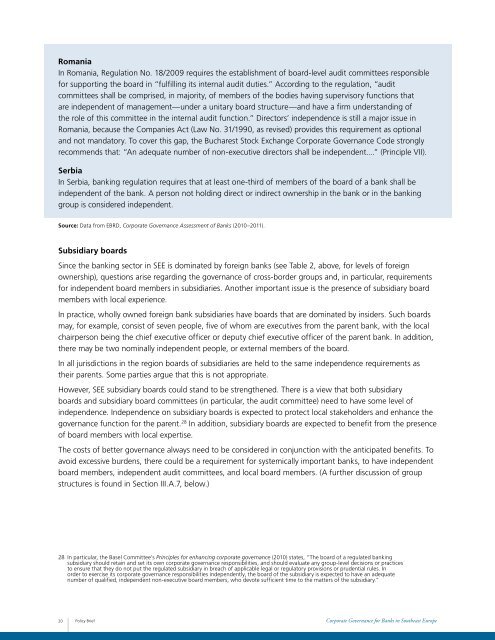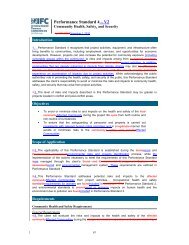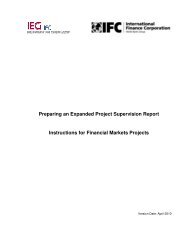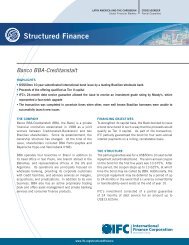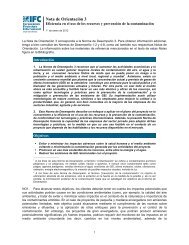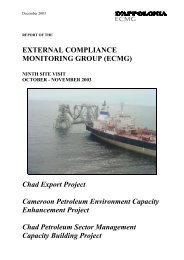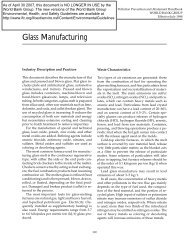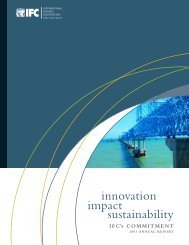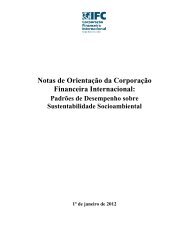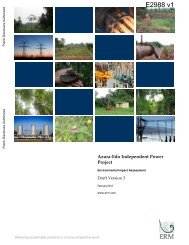Corporate Governance for Banks in Southeast Europe: Policy - IFC
Corporate Governance for Banks in Southeast Europe: Policy - IFC
Corporate Governance for Banks in Southeast Europe: Policy - IFC
You also want an ePaper? Increase the reach of your titles
YUMPU automatically turns print PDFs into web optimized ePapers that Google loves.
Romania<br />
In Romania, Regulation No. 18/2009 requires the establishment of board-level audit committees responsible<br />
<strong>for</strong> support<strong>in</strong>g the board <strong>in</strong> “fulfill<strong>in</strong>g its <strong>in</strong>ternal audit duties.” Accord<strong>in</strong>g to the regulation, “audit<br />
committees shall be comprised, <strong>in</strong> majority, of members of the bodies hav<strong>in</strong>g supervisory functions that<br />
are <strong>in</strong>dependent of management—under a unitary board structure—and have a firm understand<strong>in</strong>g of<br />
the role of this committee <strong>in</strong> the <strong>in</strong>ternal audit function.” Directors’ <strong>in</strong>dependence is still a major issue <strong>in</strong><br />
Romania, because the Companies Act (Law No. 31/1990, as revised) provides this requirement as optional<br />
and not mandatory. To cover this gap, the Bucharest Stock Exchange <strong>Corporate</strong> <strong>Governance</strong> Code strongly<br />
recommends that: “An adequate number of non-executive directors shall be <strong>in</strong>dependent....” (Pr<strong>in</strong>ciple VII).<br />
Serbia<br />
In Serbia, bank<strong>in</strong>g regulation requires that at least one-third of members of the board of a bank shall be<br />
<strong>in</strong>dependent of the bank. A person not hold<strong>in</strong>g direct or <strong>in</strong>direct ownership <strong>in</strong> the bank or <strong>in</strong> the bank<strong>in</strong>g<br />
group is considered <strong>in</strong>dependent.<br />
Source: Data from EBRD, <strong>Corporate</strong> <strong>Governance</strong> Assessment of <strong>Banks</strong> (2010–2011).<br />
Subsidiary boards<br />
S<strong>in</strong>ce the bank<strong>in</strong>g sector <strong>in</strong> SEE is dom<strong>in</strong>ated by <strong>for</strong>eign banks (see Table 2, above, <strong>for</strong> levels of <strong>for</strong>eign<br />
ownership), questions arise regard<strong>in</strong>g the governance of cross-border groups and, <strong>in</strong> particular, requirements<br />
<strong>for</strong> <strong>in</strong>dependent board members <strong>in</strong> subsidiaries. Another important issue is the presence of subsidiary board<br />
members with local experience.<br />
In practice, wholly owned <strong>for</strong>eign bank subsidiaries have boards that are dom<strong>in</strong>ated by <strong>in</strong>siders. Such boards<br />
may, <strong>for</strong> example, consist of seven people, five of whom are executives from the parent bank, with the local<br />
chairperson be<strong>in</strong>g the chief executive officer or deputy chief executive officer of the parent bank. In addition,<br />
there may be two nom<strong>in</strong>ally <strong>in</strong>dependent people, or external members of the board.<br />
In all jurisdictions <strong>in</strong> the region boards of subsidiaries are held to the same <strong>in</strong>dependence requirements as<br />
their parents. Some parties argue that this is not appropriate.<br />
However, SEE subsidiary boards could stand to be strengthened. There is a view that both subsidiary<br />
boards and subsidiary board committees (<strong>in</strong> particular, the audit committee) need to have some level of<br />
<strong>in</strong>dependence. Independence on subsidiary boards is expected to protect local stakeholders and enhance the<br />
governance function <strong>for</strong> the parent. 28 In addition, subsidiary boards are expected to benefit from the presence<br />
of board members with local expertise.<br />
The costs of better governance always need to be considered <strong>in</strong> conjunction with the anticipated benefits. To<br />
avoid excessive burdens, there could be a requirement <strong>for</strong> systemically important banks, to have <strong>in</strong>dependent<br />
board members, <strong>in</strong>dependent audit committees, and local board members. (A further discussion of group<br />
structures is found <strong>in</strong> Section III.A.7, below.)<br />
28 In particular, the Basel Committee’s Pr<strong>in</strong>ciples <strong>for</strong> enhanc<strong>in</strong>g corporate governance (2010) states, “The board of a regulated bank<strong>in</strong>g<br />
subsidiary should reta<strong>in</strong> and set its own corporate governance responsibilities, and should evaluate any group-level decisions or practices<br />
to ensure that they do not put the regulated subsidiary <strong>in</strong> breach of applicable legal or regulatory provisions or prudential rules. In<br />
order to exercise its corporate governance responsibilities <strong>in</strong>dependently, the board of the subsidiary is expected to have an adequate<br />
number of qualified, <strong>in</strong>dependent non-executive board members, who devote sufficient time to the matters of the subsidiary.”<br />
20<br />
<strong>Policy</strong> Brief<br />
<strong>Corporate</strong> <strong>Governance</strong> <strong>for</strong> <strong>Banks</strong> <strong>in</strong> <strong>Southeast</strong> <strong>Europe</strong>


